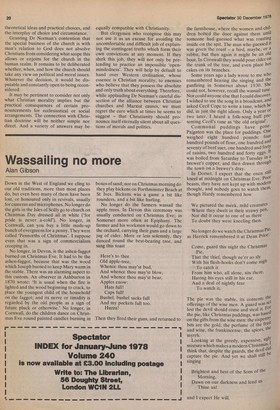Wassailing no more
Alan Gibson
Down in the West of England we cling to our old traditions, more than most places do, but even here many of them have been lost, or honoured only in revivals, usually ' for cameras and microphones. No longer do the girls in the Isles of Scilly go to church on Christmas Day dressed all in white ('for pride is never a-cold'). No longer, in Cornwall, can you buy a little made-up bunch of evergreens for a penny. They were called 'Pennorths of Christmas'. I suppose even that was a sign of commercialism creeping in.
No longer, in Devon, is the ashen-faggot burned on Christmas Eve. It had to be the ashen-faggot, because that was the wood which Joseph burned to keep Mary warm in the stable. There was an alarming aspect to this custom. An observer in Ashburton in 1870 wrote: 'It is usual when the fire is lighted and the wood beginning to crack, to place the youngest child of the household on the faggot; and its nerve or timidity is regarded by the old people as a sign of future pluck or otherwise.' No longer, in Cornwall, do the children dance on Christmas Eve round painted candles burning in boxes of sand; nor on Christmas morning do they play bickens on Porthminster Beach at St Ives. Bickens was a game a bit like rounders, and a bit like hurling.
No longer do the farmers wassail the apple trees. In Devon this ceremony was usually conducted on Christmas Eve; in Somerset more often at Epiphany. The farmer and his workmen would go down to the orchard, carrying their guns and a large jug of cider. More or less solemnly, they danced round the best-bearing tree, and sang this toast Here's to thee Old apple-tree, Whence thou may'st bud, And whence thou may'st blow, And whence thou may'st bear, Apples enow: Hats full!
Caps full!
Bushel, bushel sacks full And my pockets full too.
Huzza!
Then they fired their guns, and returned to the farmhouse, where the women and children bolted the door against them until someone had guessed what was roasting inside on the spit. The man who guessed it was given the roast — a bird, maybe, or a rabbit, but then again it might be an old boot. In Cornwall they would pour cider on the trunk of the tree, and even place hot cakes on its branches.
Some years ago a lady wrote to me who remembered hearing the singing and the gunfiring in Somerset about 1930. She could not, however, recall the wassail tune. Nor could anyone else that I could discover. I wished to use the song in a broadcast, and asked Cecil Cope to write a tune, which he did, in just the right idiom. Only a year or two later, I heard a folk-song buff presenting Cecil's tune as 'the old original'. Communal puddings have gone. Paignton was the place for puddings. One weighed eight hundred pounds: four hundred pounds of flour, one hundred and seventy of beef suet, one hundred and fortY of raisins, two hundred and forty eggs. It was boiled from Saturday to Tuesday in brewer's copper, and then drawn throng' the town on a brewer's dray. In Dorset, I expect that the oxen still kneel at midnight on Christmas Eve. P0°1beasts, they have not kept up with modern thought, and nobody goes to watch them. though Hardy remembered how We pictured the meek, mild creatures Where they dwelt in their strawy Pen, Nor did it occur to one of us there To doubt they were kneeling then.
No longer do we watch the Christmas Pie, as Herrick remembered it at Dean Prior.
Come, guard this night the Christmas Pie, That the thief, though ne'er so sly . With his flesh-hooks don't come nigh To catch it From him who, all alone, sits there, Having his eyes still in his ear, And a deal of nightly fear To watch it.
The pie was the stable, its contents the offerings of the wise men. A guard was set lest the devil should come and steal it. Pr, the pie, like Christmas puddings, was base on the gifts from the wise men: the sixperill, bits are the gold, the perfume of the fro" and wine, the frankincense; the spices, the myrrh. Looking at the greedy, expensive, uglY/ mixture which makes a modern Christmas:A think that, despite the guards, the devil di' capture the pie. And yet we shall still be singing Brightest and best of the Sons of the Morning, Dawn on our darkness and lend us Thine aid and I expect He will.






















































 Previous page
Previous page